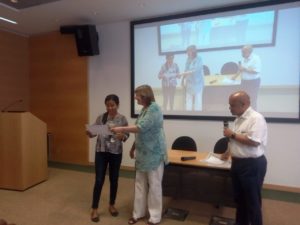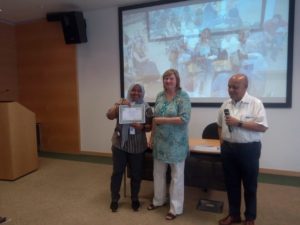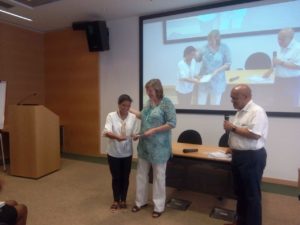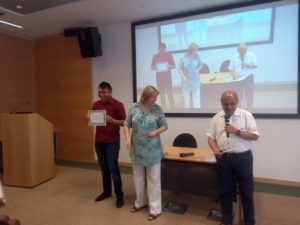Fellows walk away with unparalleled knowledge and experiences
- dunjamijatovic
- Jul 17, 2019
- 3 min read
After a fruitful Fellowship programme, the Fellows bid goodbye to Rome and head back to their communities with unforgettable memories, knowledge and experiences.
A couple of months back, four Fellows, from 3 different countries, representing 4 different matrifocal communities, embarked on a journey of sharing their indigenous stories and learning about tools for the revitalisation of their communities and indigenous food systems. Aided by TIP’s Youth Fellowship Programme, the Fellows gained unique international and intercultural experiences and skills to add to their profiles.
Phrang Roy, on behalf of TIP, thanked the Bioversity staff for their unparalleled support and contribution while Hart Cicconi Gaynor, Human Resource, Bioversity, handed over certificates of achievement to the four Fellows, Chenxiang Marak, Nofri Yani, Merrysha Nongrum and Edgar Monte during the concluding session of the Fellowship.
After the farewell ceremony, Phrang Roy summarised the following key takeaways that the Fellows need to consider when they go back and work with their respective communities.
Before discussing with the communities, particularly on the issue of climate change, Fellows need to brief themselves about the concept of the water cycle as raised by Arturo during the first day of the Rome briefing. To get a better understanding of the concept, Bah Phrang suggested watching a video of Walter Jehne.
When going to the field as facilitators and helping communities to develop local proposals, think about the strategic objectives that would be needed. Review the documents of Anna and practice the operationalization of the concepts of vision, mission, outcomes, impacts and outputs. Fellows need to reflect on the notes given by Anna. While developing an objective, remember, SMARTER. When we talk about risk, remember ERIC principle. Also, when designing any initiative, also consider the DO NOTHING situation and the cost of the same to your plans.
While dealing with agrobiodiversity in our fields, we need to also remember to identify priority crops with potential for increased production and consumption.
Documentation and evidence building is a crucial part of the Fellows’ work.
We were reminded through the various studies of Bioversity that the vast biodiversity is actually maintained by a few custodian farmers and not necessarily by all farmers or community members. Identify and work with these custodian farmers.
To empower people, Fellows should master the tools they have learned over 2 months through the Fellowship programme.
Reflection of the work done by the Agroecology Learning Circles should be held regularly.
Fellows to reflect on the innovative ideas gained during the TIP Fellowship Programme such as building a Rural Youth Advisory Council and try to adapt them to their local context. We should explore the idea of developing a participatory laboratory for climate change with our communities
A discussion on farmer’s rights should be held every quarter. NESFAS and TIP will take the lead. Review the submissions that are provided in the website of the secretariat of the Office of the International Treaty for Plant genetic Resources for Food and Agriculture.
We should take the landscape approach into the work that we do. For example, the importance of forest and fishery has never been reviewed in our work at our respective projects in our hometowns.
For NESFAS, a visit to Maharashtra Nutrition Mission is a useful idea.
Resource mobilisation: We could also look into GEF 7 and UNDP’s Small Grants under GEF for possible funding for our initiatives like IFCA, etc. TIP will be willing to help to explore this idea.





Comments